Dave Alred never imagined 2020 working out like this. Famed for his role in helping England win the 2003 World Cup, the kicking king arrived in Queensland in March for a pit-stop at the Super Rugby Reds before the year would then open up in front of him.
Having already made headlines by assisting All Black Beauden Barrett in January, his diary was packed with in-person appointments around the globe, not only in rugby but in golf, the sport he went down an exploratory mid-2000s rabbit hole after helping Jonny Wilkinson reach rugby greatness.
However, with the pandemic shutting down everything and everywhere, Alred was forced to stay in place in Australia and it is why, eight months later, the coach is still hunkered down in Brisbane and adapting to the new working ways of the world.
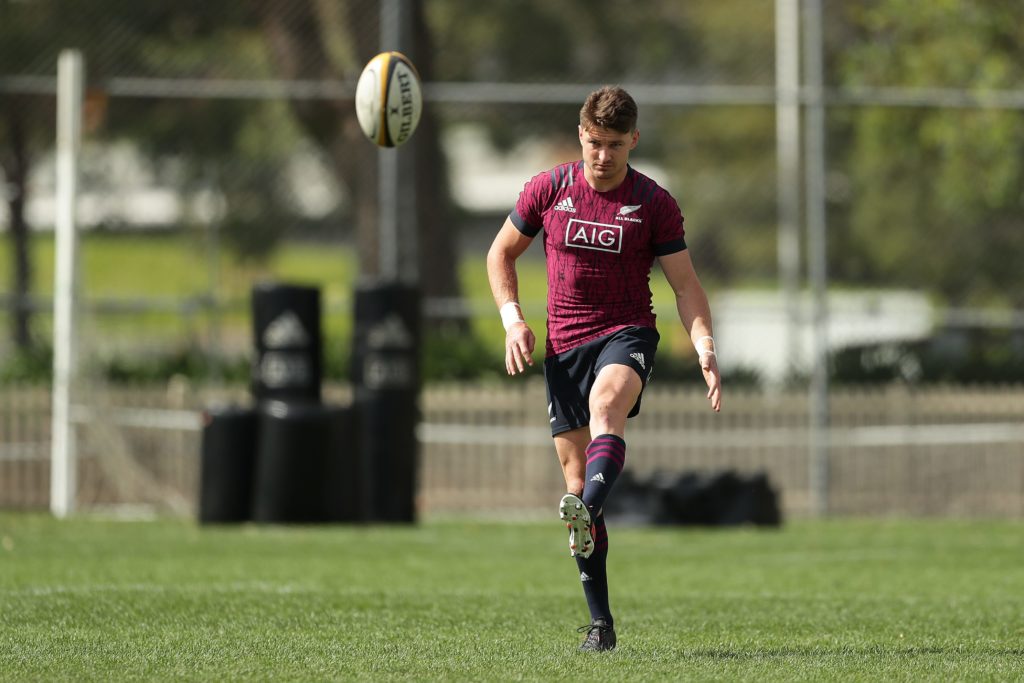
How has life changed? “Dramatically,” he said over Zoom to The XV, explaining the impromptu adaptations to his renowned teaching methods. “I came here in early March with a view to being here for three to four weeks and was then meeting up with Francesco Molinari for a week’s training and then off to Augusta. That was my game plan.
“Well, the reality is I came in March and haven’t left since. There are no flights and it’s very difficult to move. We were in lockdown in Queensland. On the plus side, they have done very well in handling the virus relative to some countries in the northern hemisphere. But it’s a total loss of freedom to travel, which really hurts me as far as my business is concerned.”
So how is the kicking guru now improvising with the biggest clients on his dance card? “With Johnny Sexton and George Ford I can Zoom and although I did a couple of (in-person) sessions with Beauden Barrett, I do the same now with Beauden,” he said.
“I’m much more hands-on with the Reds because I’m physically here, so I’m working with James O’Connor, Bryce Hegarty and Jock Campbell. It has been very taxing but it has actually been quite interesting becoming more innovative in how you structure stuff, how you communicate and how you get players to organise sessions.
“What is really helpful is the players send me messages. WhatsApp is a goldmine because as soon as they send three or four kicks I can tell pretty much straight away these are the areas that if you follow are going to help you quite enormously.”
Kicking has come in for some negative scrutiny again recently. The recent ‘Super Saturday’ finale to the Six Nations, for instance, witnessed 179 kicks from the hand across the three games in Llanelli, Rome and Paris.
People often think that kicking is actually a surrender, ‘We can’t do anything, just kick the ball down there’.
Seventy-five occurred in Italy versus England and with the box-kick a huge part of England’s 44 kicks, former international Austin Healey feared the overuse of the box-kick will eventually be the death of rugby.
On the contrary, Alred believes there isn’t enough kicking in matches. “You have got to remember there is a lot of encouragement for the kickers to kick from the rest of the team,” he said. “But the kicking game is not completely understood by everybody.
“People often think that kicking is actually a surrender, ‘We can’t do anything, just kick the ball down there’. However, a team with a good kicking game that will actually pin the opposition back actually have more opportunity to run. Some of the teams you think are running teams do actually kick the ball a lot: restarts, goal-kicking, kicks for touch, for penalties, all the other bits and pieces, it adds up to a massive part of the game.
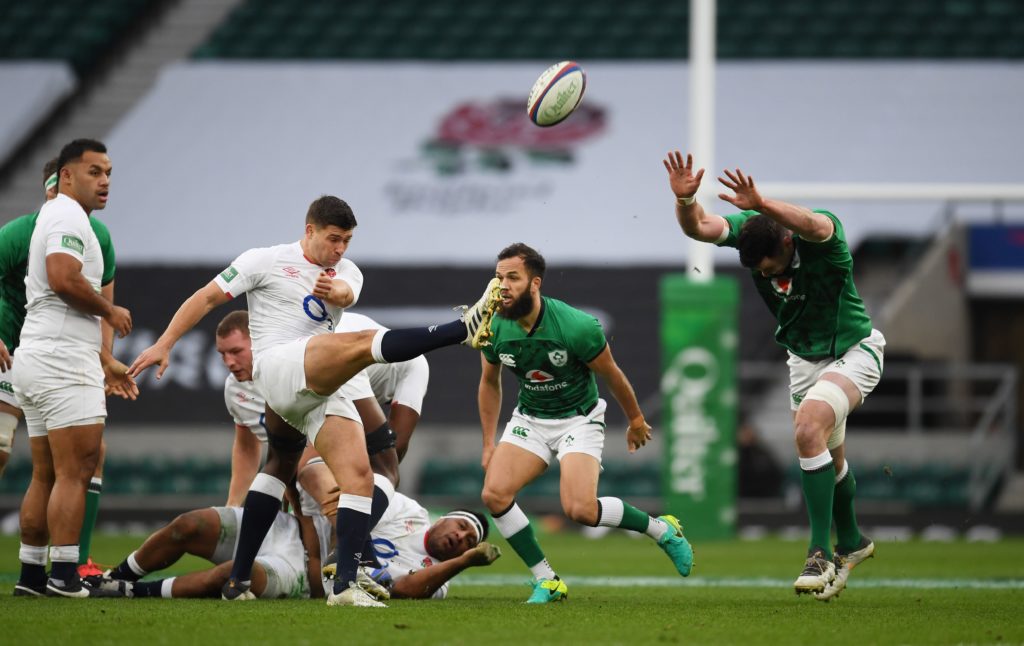
“My thing is everybody can improve kicking and I don’t think people spend enough time executing kicking as a skill that enables them to perform in various parts of the game. Part of it is we have discovered very quickly that if somebody can’t do something then they change their role so they don’t get exposed.
“So quite a lot of backs became ‘I’m a runner’ but actually you need to be a runner and a kicker, and it’s worrying that so many players get so far on in their careers without learning basic kicking skills. It takes somebody quite brave to be able to do something about it, so they hide from it.
“Coaches for whatever reason go, ‘Yeah, we’ll select him because he is a good runner and we’ll select him because he is a good kicker’. I’m actually thinking those two things are one. If the good runner can become a kicker then you’d be much better off, but there is also an unfounded thing where people say if they kick incorrectly technically they get sore if they practise too much and possibly get injured.”
The more complete footballers should be able to do it, at least be comfortable in putting the ball forward and being able to run on to it.
Innovation warms Alred’s heart, the coach adding how it is imperative for forwards to get in on the kicking game. “Definitely all the back rows should be capable of kicking because sometimes they are arriving at a breakdown and there is a chance to break. Because defences are so tight, if you can place the ball behind them so they have to turn, you can then chase and it is a tough thing to defend against.
“We have got a couple of forwards in the Reds who have seen the opportunity to punch the ball and turn the opposition. Even one of the front row guys did it not so long ago. The more complete footballers should be able to do it, at least be comfortable in putting the ball forward and being able to run on to it.”
The passion within Alred for improved kicking is easily discerned. He could be selfish, could restrict himself to only minding the professionals, but he is too much of a fanatic and was chuffed his English-based ‘School of Kicking’ recently held the inaugural Alred Trophy at Nottingham RFC.
With Alred in Australia, school head coach Tony Yapp and England international Emily Scarratt were on hand as 15-year-old Joshua Bellamy, representing Trinity School in Croydon, was crowned best young kicker in the UK and Ireland. Everyone who attended went home with eyes wide open.
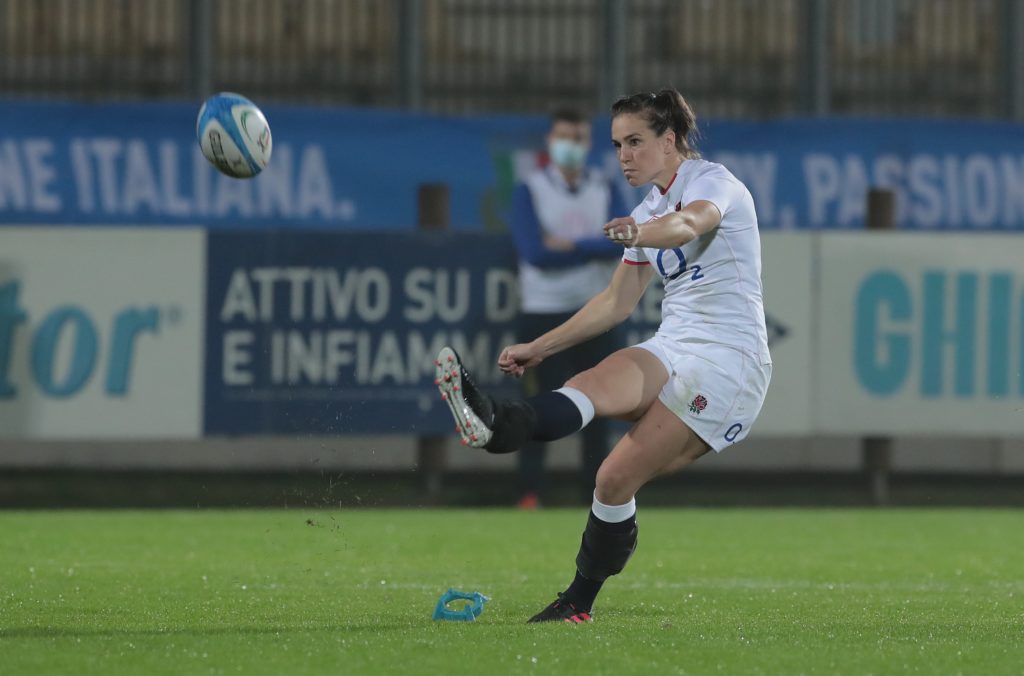
“I have created a model which we use in the ‘School of Kicking’, grouping the kicks in reverse order of how much effort it puts on your body,” said Alred. “Believe it or not, the most comfortable kick in terms of your body is the jogging spiral. People would often be horrified to realise this but it is the easiest kick atomically to do and we use that because it is very sensitive in terms of balance.
“If you don’t quite get it right it is difficult so that’s a really good barometer. The other thing I do for a lot of a session is I don’t let players put more than 40 per cent effort into the kicks. It is harder to kick softly or softer and controlled than it is to hit it really hard. When you hit it hard it often disguises technical flaws.”
Softly was precisely what Alred had Barrett doing at the start of the year, breaking down the mechanics in order for him to become better, and he would love children to follow that example.
When I started off with England way back in 1997, a lot of guys were incredible players but they couldn’t kick.
“If kids could learn basic fundamentals at an early age they would reduce the amount of injury, they would hopefully have a rudimentary idea of the basic principles and they would be able to work on their own both safely and effectively,” he said.
“That is the idea but often in my experience, particularly when I started off with England way back in 1997, a lot of guys were incredible players but they couldn’t kick and you’re trying to teach people who are mindful of the amount of physical work, the running, the weights, the conditioning and all the rest of what goes on. It was actually very challenging indeed.
“I was tested a lot to find a way to get players to learn to kick in a way that uses their body shift, which is what I do with Sexton, rather than their leg. I’m trying to look at a kinetic chain that has the least amount of physical tax on the person’s body and it’s the easiest way to learn to kick.
“I remember Brian O’Driscoll when he came on the Lions in 2001, we wanted backs that could kick so we learnt straight away that the best way is to teach people to kick on the run. I still see people standing still kicking and then reckon that they learn better by running after it and I completely disagree – kick on the run!”
Memories remain vivid from those heady early days of rugby professionalism, success with the 1997 Lions opening a door for Alred with England that culminated in beating Eddie Jones’ Australia in their backyard in the 2003 World Cup final.
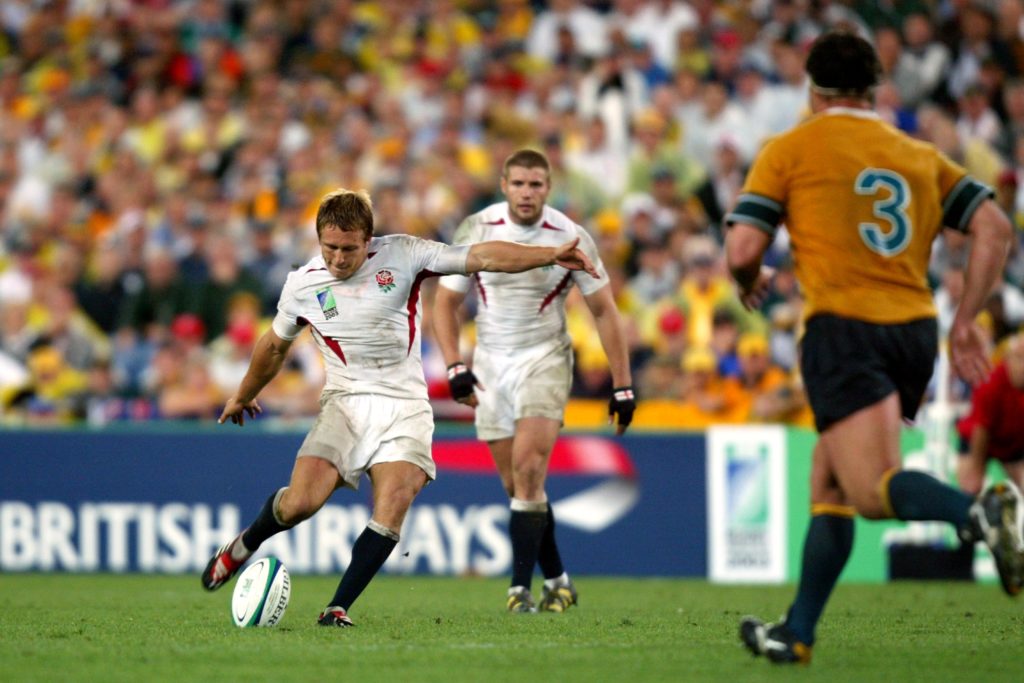
“If you go back to that final and talk to Eddie Jones, one of the first things they decided to do was to kick on Jason Robinson because Jason Robinson was ‘a rugby league convert who couldn’t kick’. Well, I worked with him from day one and he can kick. He kicked really well and he upset the Australians quite considerably by doing it.
“The second thing is if you go into extra-time, everybody talks about Wilkinson’s drop-goal – what they don’t see was what created that drop-goal. It was actually Mike Tindall. Wilkinson hit Tindall playing the 13, who hit a long, raking kick right down into the pocket and the Aussies had a lineout inside their own 22. From that lineout, they kicked for touch and they only were up to 35m out. From that lineout, we ran ‘the zigzag’, dropped the goal and won the World Cup.”
Coaching golf has actually made me a better rugby coach in terms of practice, precision, attitude, performing under pressure, one shot, one opportunity.
Ironically, being on top of the world led to Alred becoming so frustrated with rugby that he diversified into golf, a fascination that persists and had him glued to TV coverage of the rearranged Masters.
“What people don’t understand is that coaching golf has actually made me a better rugby coach in terms of practice, precision, attitude, performing under pressure, one shot, one opportunity,” he said. “All of those things, there is a great deal of similarity between the preparation and the mental side of both of those activities, goal-kicking and hitting a golf shot.
“What actually happened after 2003, new players came into the England set-up and I found myself getting frustrated they couldn’t kick. But then I was so cross with myself because I had actually fallen into the trap of not having empathy with the learner. I didn’t understand the frustration.
“Because I had a good group of players for nearly five years, when you start again you just think it should carry on but I seem to have lost that and thought, ‘What can I do?’ I decided I’m going to play golf properly as it’s one of the most frustrating sports.
“At that time I was contacted out of the blue by Luke Donald. He wanted to know how you perform under pressure. To cut a long story short, I did a week with him in Miami and then the rest is history. I changed a lot of what he did, changed a lot of his attitude and within two and a half years he was world No1.
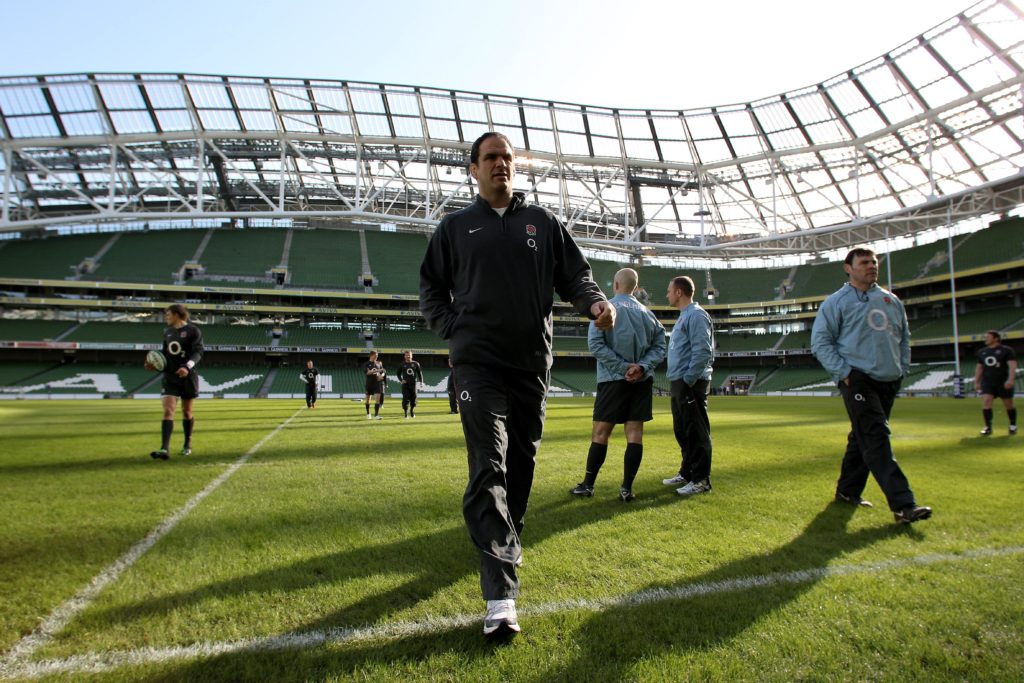
“That was a really interesting time for me and I actually thought I was the best coach in rugby at that time because I had really learnt as much about performing under pressure. I kept that going, did some work with Pádraig Harrington, but I then got back involved with rugby with Martin Johnson.
“I thought he was an absolutely outstanding man amongst men. I thought he had the unbelievable potential to be an outstanding coach but it was a shame (he left after the 2011 World Cup). I feel he wasn’t given a fair throw of the dice.
“Then I did all sorts of other things. Wrote a book, did a few other bits and pieces and then Molinari contacted me about three years ago now and I started again with him. He was further down the world rankings when I started but that has been very successful apart from the injury just recently.”
More England stories
If you’ve enjoyed this article, please share it with friends or on social media. We rely solely on new subscribers to fund high-quality journalism and appreciate you sharing this so we can continue to grow, produce more quality content and support our writers.



Comments
Join free and tell us what you really think!
Sign up for free